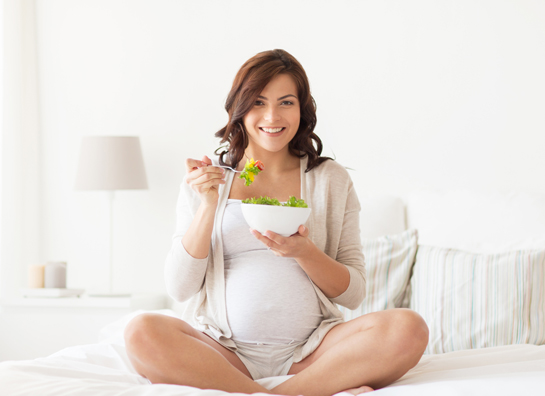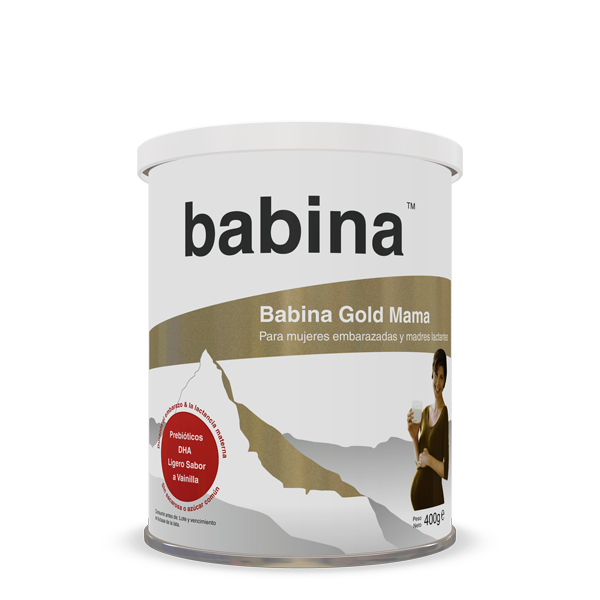Well-being for mother and child

Your dietary intake before and during pregnancy is now known to have an impact on the health and wellbeing of your baby in both the short and long term. Your body has specific nutritional needs that not only support your physical and hormonal changes but also the healthy growth of your baby. The food you eat is your baby’s main source of nourishment; proper nutrition can help promote growth and development.
About weight gain
Weight gain in pregnancy is natural and necessary. Besides the additional weight of your baby and increased fluids, your body gradually lays down some fat stores. Your weight gain in this period depends on your pre-pregnancy weight, and varies from mother to mother. Most women gain between 10 and 13 kg while pregnant.
Eating for two is not necessary
There’s no need to eat more food during the first trimester of pregnancy. Your energy intake should stay about the same as it was before you became pregnant. During the second and third trimesters, your energy requirements may increase. Enriching your diet with small snacks, such as an additional piece of fruit, a sandwich, a glass of milk and a portion of yoghurt will provide the extra energy required.
‘Eating for two’ may result in gaining too much weight, which can increase the risk of chronic problems. On the other hand, gaining too little weight during pregnancy is not advisable either.
A varied daily diet
A healthy daily diet is vital when you are pregnant or planning a pregnancy. To obtain all the nutrients you need, your diet must cover a variety of food groups, including grains and bread, fruits and vegetables, dairy products and other protein sources. Include foods from each of the food groups every day, and try to limit intake of fatty, sugary or salty foods.
It is important to eat a variety of foods throughout the day to be sure you get the nutrients both you and your baby need.
Present colourfully and attractively
- Whole grains such as oats, whole-wheat pasta or bread and brown rice, and other starchy foods. Several servings a day for a healthy intake of energy, fibre, calcium, iron and B vitamins.
- Plenty of fruit and vegetables; at least five servings a day (wash thoroughly or peel). These colourful foods are low in calories and filled with fibre, vitamins and minerals.
- Milk and dairy foods (like cheese and yoghurt); several servings a day. These foods are sources of protein and calcium. Avoid raw products and choose lower-fat varieties for a healthy intake with fewer calories.
- Moderate amounts of lean meat, eggs, fish and other non-dairy protein sources (legumes/beans), including two portions of oily fish per week (salmon, sardines, herring mackerel). For a healthy intake of protein, DHA, fibre, iron, vitamin D and other vitamins and minerals.
Make the most of breakfast time
It’s well known that breakfast is the most important meal of the day. But during your pregnancy, it is especially beneficial. A balanced breakfast boosts the day by providing your body with key nutrients.
Here are some ideas:
- Porridge
- Muesli or cereal with milk or yoghurt and fruit
- Scrambled eggs on whole-grain toast (ensure eggs are well cooked)
- Salmon, or mackerel with some slices of avocado on whole-grain toast
- Fruit and yoghurt
- Fruit/vegetable smoothie
Avoid unhealthy food
Limit the amount of added sugar and salt and limit the amount of fatty and sugary food. Cakes, biscuits, crisps and other fatty or sugary foods have little nutritional value. Avoid alcohol consumption throughout your pregnancy as there is no known safe level and even small amounts may harm your baby.
Make sure you drink enough
An adequate intake of water is essential for your own health and your baby’s development. It keeps the body systems working properly, while helping absorb nutrients and flush out waste products. During pregnancy, you need more water than usual to meet the increased requirements and to avoid dehydration.
Quantity and type of fluids during pregnancy
Make sure you drink enough water as this can help to reduce the problem of hard stools. The general recommendation is to drink 1.5 – 2.0 litres of water or other beverages per day (8 to 10 glasses of 200 ml). That means that pregnant women should increase their fluid intake by around 300 ml per day.
You might find you need a little more or less. You are getting enough if your urine looks pale-yellow or colourless; you are likely to need more fluid than usual in a warm climate, at high altitude, or when you are very active.
Plain water is the ideal beverage to keep you hydrated, straight from the tap (if safe in your area) or bottled (still or carbonated). Other suitable drinks are milk and fruit juices. These all contain water and add toward your fluid intake. Soup also counts, and can provide a good serving of beneficial nutrients too.
Bear in mind that juice and sweetened drinks also provide a lot of extra calories and should be avoided in large quantities. Juice can be high in sugar; when it is pure fruit juice, however, it can also count as part of your daily fruit intake. It's best to limit caffeine too, including caffeinated coffee, teas, and sodas.
What to eat for a vegetarian pregnancy
A vegetarian diet can definitely be a healthy choice when you are pregnant, but you need to ensure your diet is balanced and provides all the nutrients you and your baby need. You need to concentrate on obtaining sufficient quantities of the key nutrients such as protein, long chain omega-3 fatty acids (DHA), iron, zinc, calcium, vitamin D, vitamin B12 and folate. A nutritionist or dietician can give you good advice on this and draw up a personal nutrition plan.
Always consult your doctor or midwife before taking any supplements while you're pregnant.



